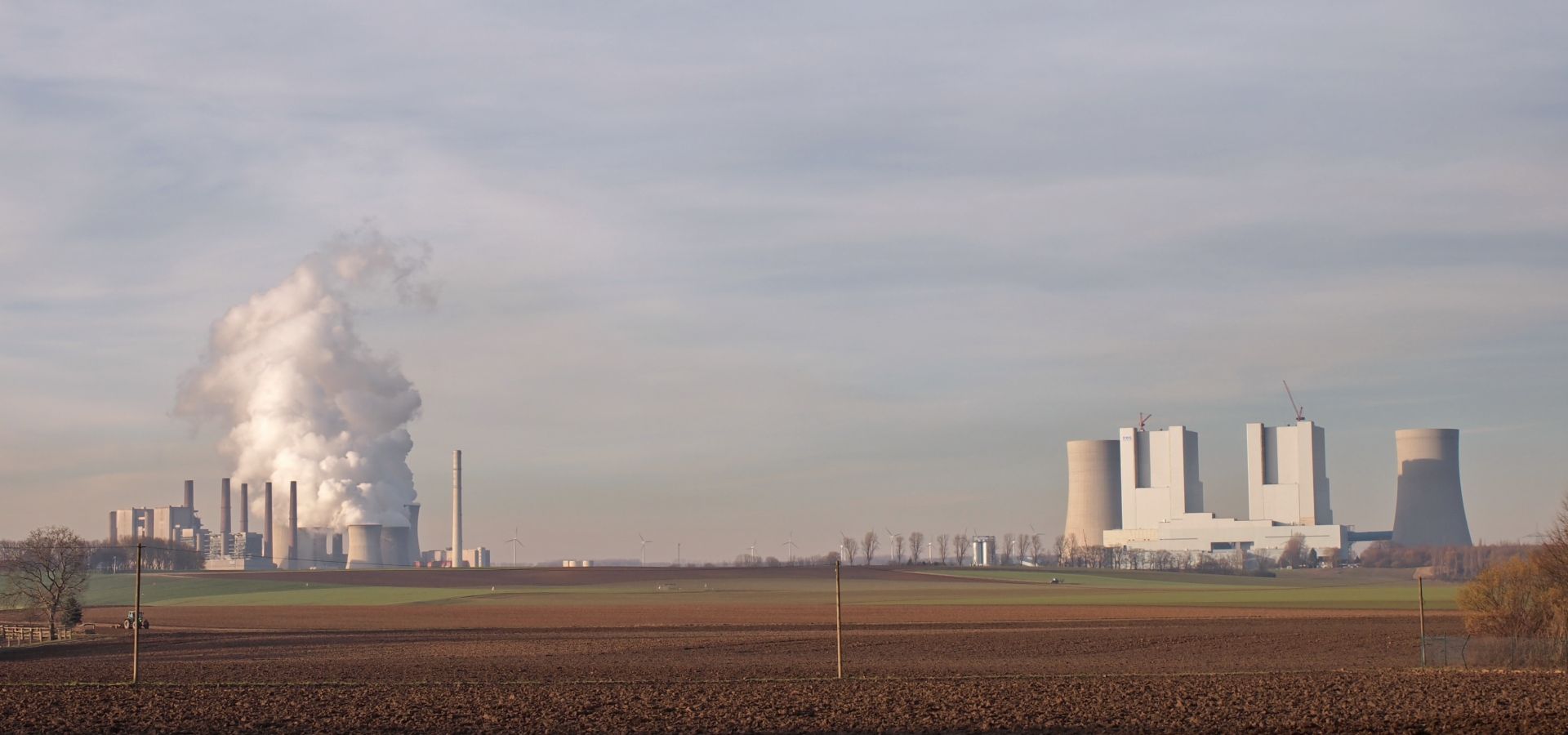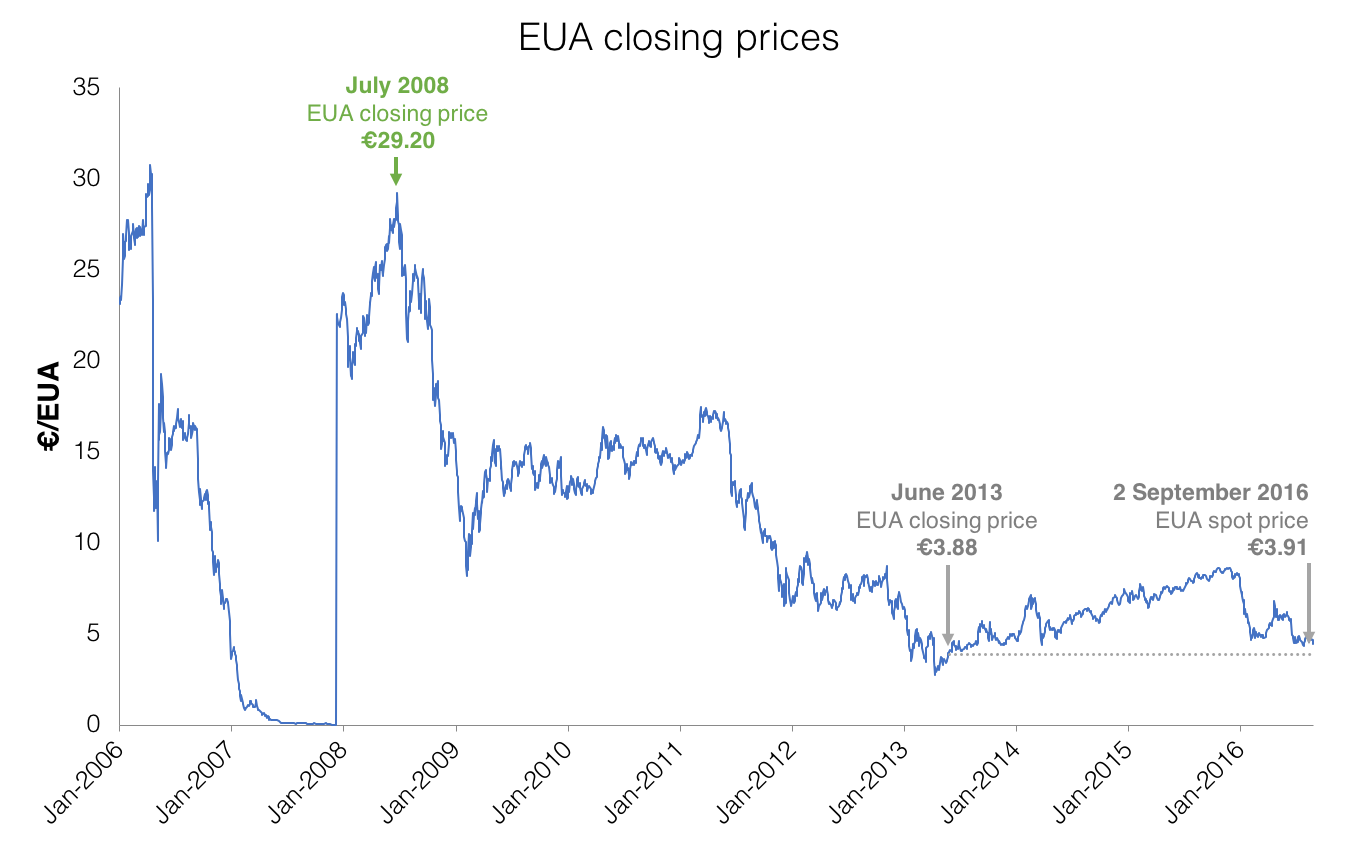Last week, the EU announced new plans for its Emissions Trading Scheme (ETS). Climate experts point out that the changes still fall short of the Paris Agreement. German renewables association BEE has therefore proposed a carbon tax, but critics of the plan say it would only weaken the ETS further. Craig Morris takes an in-depth look.

Lignite at Neurath (Photo by Stodtmeister, edited, CC BY-SA 3.0)
The price of carbon is back in the news. The UK may or may not stay within the ETS after Brexit, and in the US a group of Republicans is seriously talking about carbon taxation. Experts estimate that a carbon price of 30 euros per ton of CO2 would be needed for a switch from hard coal to natural gas in Germany – and 50 euros or more for a switch from lignite to gas. But the ETS price fell to a meaningless four euros once again last fall, and is now stuck at a hardly better five euros.

The price of carbon on the ETS is uselessly low. (Source: Sandbag.org)
Obviously, more emission allowances are available than needed. The EU therefore decided last week to remove 2.2 percent of emission certificates annually – a step forward, but hardly enough. At the annual conference of the German Renewable Energy Federation (BEE) held the day after the announcement, the price of carbon was the central topic. As BEE president Fritz Brickwedde put it, “Emissions would need to be reduced by 4.7 percent annually to be in line with the 2°C target.”
His organization is therefore calling for a carbon tax in Germany to replace the electricity tax of around two cents per kilowatt-hour (roughly seven percent of the retail rate). A floor price of 20 euros per ton of CO2 would be implemented nationally when power prices are positive on the exchange. When they drop into the negative, a higher price “in line with the actual cost of CO2” would be charged (press release in German). The heat sector, which remains the domain of EU member states instead of being part of the ETS, would also have a carbon price imposed on it in the BEE’s plan.
Of course, a higher carbon price would make renewable energy more competitive indirectly. A carbon floor price is also a progressive tax since richer households generally consume more energy – and higher prices incentivize efficiency. But Thomas Bareiß, a member of the Bundestag’s Committee on Economics and Energy, defended the ETS in a panel discussion at the BEE’s event: “The ETS works. The new lignite plant in Neurath spends 60 million euros on certificates each year.”
A carbon floor price in Germany, the argument generally goes, only makes emissions cheaper in neighboring countries, thereby hurting German competitiveness. Bareiß stated his opposition to Germany “going it alone” with a minimum carbon price – not only within Europe, but worldwide – this way: “We have to convince others countries like China and the US that carbon trading is a good policy tool for a level playing field in a worldwide ‘carbon wende’.”
In practice, of course, such a proposal means that the slowest countries would set the pace for Germany. In addition, Germany would hardly be going it alone with a floor price for carbon within the EU; the UK has one (a minimum price of 18 pounds per ton or around 20 euros), as do Sweden and Finland. France proposed 30 euros per ton, but then failed to implement it.
But Bareiß mainly stressed the international, not the European, context: “The Chinese will emit a lot more CO2 annually be 2030. They are currently building 75 GW of new coal capacity worldwide – not in China alone.” His statement that “using the most efficient German lignite plants instead of dirtier coal plants now being built in Turkey with Chinese financing would be better” met with great dismay in the panel’s audience.
It is also unclear what Bareiß meant by, “In the next decade, Germany aims to reduce emissions twice as much as we have in the past thirty years.” It may have been a misstatement. Germany has no CO2 target for 2027 but roughly aims to cut emissions by 1.5 percentage points annually. Over a decade, that would be 15 percent – around half (not twice) as much as German reductions since 1990.
Green party Energiewende expert Robert Habeck, who also sat on the panel, disagreed with Bareiß: “We don’t have control of {other countries’ policies}, so we should focus on what we can get done, including internationally.”
The head of BUND (Friends of the Earth Germany) put it less diplomatically: “We knowingly betray the public when we say we are all for 1.5°C – and then we do nothing to reach that goal.”
Craig Morris (@PPchef) is the lead author of Global Energy Transition. He is co-author of Energy Democracy, the first history of Germany’s Energiewende, and is currently Senior Fellow at the IASS.
The ETS is a dead man walking. The European Parliament is the greenest legislature we can reasonably hope for, and it accepted carveouts to the ETS reform that have ensured its continuing irrelevance.
To an economist. a well-designed cap-and-trade system and a well-designed carbon tax do he same job and are formally equivalent. The real difference is in political psychology. A cap-and-trade system creates entitlements in the initial allocation. People really hate losing entitlements, far more than they hate external impositions like new taxes. A cap-and-trade system is therefore extremely sensitive to getting the initial allocation just right, which is practically impossible. So the only scheme that can ever work in practical politics is a carbon tax. You lose the trading benefit; but with a worldwide commitment to decarbonisation, choosing a slightly more efficient pathway by trade matters much less than getting national policy signals everywhere approximately right.
So let’s push for carbon taxes. In the EU, these should be fairly uniform, like VAT. The EU-27 have quite enough leverage to impose a similar standard on a post-Brexit Britain.
Dieter Helm would disagree with you James. He favours carbon taxes as being econometrically more “efficienct” – I guess he just means they have a chance of working as opposed to no chance wrt ETS. The CEPS guys keep backing ETS on the basis that it is the only girl in town – but even Dong – publicly said that the EU ETS has NEVER led to any carbon reductions – not a message that goes down well in DG Energy/Envo in Bxland. I have always thought that carbon taxes were the way to go – & also border carbon taxes – which would set the cat amongst the pidgeons.
Bareiß:”The ETS works. The new lignite plant in Neurath spends 60 million euros on certificates each year.”
That is what we nowadays call fake news. If the ETS works, then why are the prices so low that most scientists say it has absolutely no effect on reducing emissions? How can it work when there are much more certificates than emissions? And what does the claim (is it true?) that RWE pays 60 million euros on certificates have to do with that? Nothing at all. What a ridiculous politician and lobbyist.
And to put the 60 claimed 60 millions for certificates in perspective: Neurath emits absout 32 million tons CO2 a year. https://de.wikipedia.org/wiki/Kraftwerk_Neurath So RWE pays the tremendous amount of 2 euro/ton CO2. However the external costs of fossil fuel production was about 150 $/ton in 2013, in total 4.9 trillion $ worldwide. https://de.wikipedia.org/wiki/Externer_Effekt#Externe_Kosten_bei_der_Energieerzeugung
[…] already small share of coal power. However, the French have had a plan for a minimum carbon price for some time now; unlike the UK, they simply refuse to implement one unilaterally – in particular, they want […]